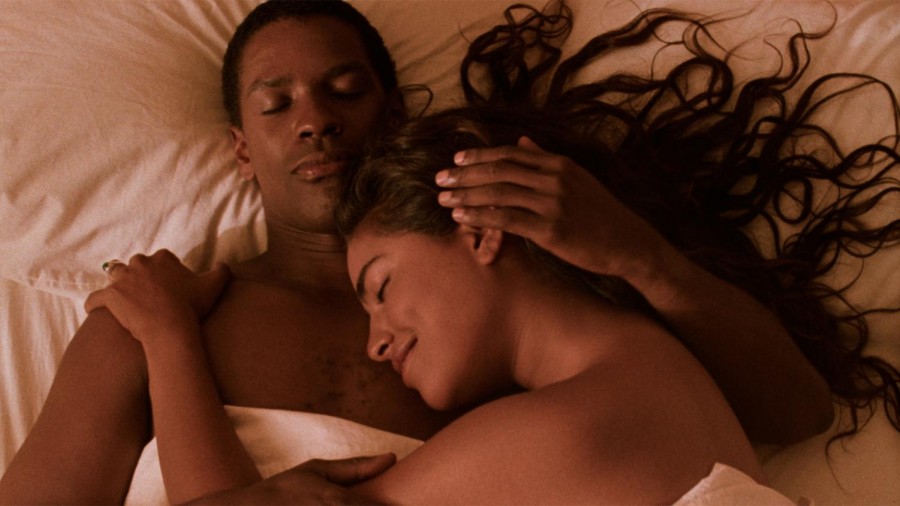‘Mississippi Masala’ explores mixed-race relationships and the feeling of home
The recently restored ‘Mississippi Masala’ showcases director Mira Nair’s progressive depictions of different diasporas on film.
The 1991 film “Mississippi Masala” portrays an interracial couple pursuing a relationship in defiance of familial expectations. The film is available in 4K at the IFC Center starting April 15. (Image courtesy of Janus Films)
April 15, 2022
The new 4K digital restoration of “Mississippi Masala,” undertaken by the Criterion Collection and supervised by director Mira Nair and cinematographer Edward Lachman, will open April 15 in New York at the IFC Center and April 22 in Los Angeles at the Nuart Theatre, followed by a national rollout. The restoration has prompted us to revisit the 1991 film.
“Mississippi Masala,” directed by Nair and written by Sooni Taraporevala, stars an ensemble cast including Sarita Choudhury (most recently seen in HBO Max’s “Sex and the City” revival television series “And Just Like That…”), Sharmila Tagore (living legend and leading heroine of the golden age of Hindi and Bengali cinema) and Denzel Washington, winner of the Tony Academy and Golden Globe Awards. The cast also includes personalities of Indian theater and parallel cinema Roshan Seth and Mohan Agashe.
The film starts with a flashback to Kampala, Uganda, in 1972, where dictator Idi Amin implements a policy to forcefully remove Asians from Uganda. As a result, Jay (Roshan Seth), his wife, Kinnu (Sharmila Tagore) and their daughter, Mina (Sarita Choudhury) — a family of the diasporic Ugandan Indian community in Kampala — are forced to leave their property and flee the country, first to England, then to Mississippi. Born and brought up in Uganda, Jay considers the country his home and is outraged by the forced removal
The film moves to Greenwood, Mississippi, where Mina is now 24 years old and her extended Gujarati family runs a motel. Mina is free-spirited, raised to be an independent woman by her parents. Her family runs a liquor store while she works at the motel cleaning bathrooms. Mina has yet to receive a formal college education since her family is not in the best financial standing. Her father is still trying to write to the Ugandan government in hopes of reclaiming their rightful property and lost money.
Mina isn’t interested in the Indian man her parents encourage her to marry, and soon falls in love with a self-made black man named Demetrius Williams (Denzel Washington), who runs his own carpet cleaning business. As she gets more involved with him, her extended family finds out, causing a huge commotion in both their families and leading to police involvement. Mina and Demetrius’ interracial relationship forces their conservative families and immediate communities to inspect their own prejudices and explore community and love, beyond the limiting identities of race.
Capturing the beautiful landscapes of Uganda and the richness of Indian and Black cultures within the context of the U.S. diaspora through the cinematography of Lachman and film score of L. Subramaniam, the film tackles issues such as racism, colorism and the culture clash. Nair shows the Black communities of Uganda as well as the southern United States with as much selfhood, brotherhood and empathy as her Indian community. In many conversations, we see the dynamics of race manifesting between the brown, Black and white communities in a melting pot of diversity.
Much of the dialogue in the film highlights the prevalence of racist rhetoric among marginalized communities in America. Nair’s decision to include Denzel Washington doing an Indian accent as a joke against Indian Americans is an example of how the film’s commentary falters despite its realistic depiction of 1990s southern culture. Although these moments have not aged well, the film was still a radical step forward in its nuanced depictions of underrepresented communities in the United States.
The dialogue carried out by the diverse cast of characters in “Mississippi Masala” points to a sustained generational racism in their approach to discussing race that ultimately inhibits their ability to be open with one another despite their common struggles in America. “Mississippi Masala” is ultimately about the questions of belonging versus alienation as the characters try to reconnect to roots that they’ve never seen in the first place, while blending into their foreign environments. The film is about understanding the feeling of home, as the characters search for their own ones, in their nations, communities and the people they love.
Contact Indranil Basu at [email protected]
























































































































































